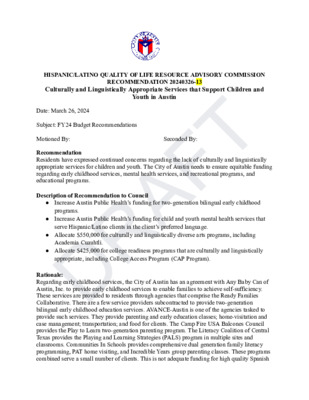Draft Recommendation FY 24-25 Supporting Children and Youth in Austin — original pdf
Backup

HISPANIC/LATINO QUALITY OF LIFE RESOURCE ADVISORY COMMISSION RECOMMENDATION 20240326-13 Culturally and Linguistically Appropriate Services that Support Children and Youth in Austin Date: March 26, 2024 Subject: FY24 Budget Recommendations Motioned By: Recommendation Residents have expressed continued concerns regarding the lack of culturally and linguistically appropriate services for children and youth. The City of Austin needs to ensure equitable funding regarding early childhood services, mental health services, and recreational programs, and educational programs. Seconded By: D R A F T Description of Recommendation to Council ● Increase Austin Public Health’s funding for two-generation bilingual early childhood ● Increase Austin Public Health’s funding for child and youth mental health services that serve Hispanic/Latino clients in the client’s preferred language. ● Allocate $550,000 for culturally and linguistically diverse arts programs, including programs. Academia Cuauhtli. ● Allocate $425,000 for college readiness programs that are culturally and linguistically appropriate, including College Access Program (CAP Program). Rationale: Regarding early childhood services, the City of Austin has an agreement with Any Baby Can of Austin, Inc. to provide early childhood services to enable families to achieve self-sufficiency. These services are provided to residents through agencies that comprise the Ready Families Collaborative. There are a few service providers subcontracted to provide two-generation bilingual early childhood education services. AVANCE-Austin is one of the agencies tasked to provide such services. They provide parenting and early education classes; home-visitation and case management; transportation; and food for clients. The Camp Fire USA Balcones Council provides the Play to Learn two-generation parenting program. The Literacy Coalition of Central Texas provides the Playing and Learning Strategies (PALS) program in multiple sites and classrooms. Communities In Schools provides comprehensive dual generation family literacy programming, PAT home visiting, and Incredible Years group parenting classes. These programs combined serve a small number of clients. This is not adequate funding for high quality Spanish and bilingual (Spanish and English) early childhood education and services that also includes case management, parenting education, literacy and educational programming for parents, and community support. These programs help the child and parents by providing them with support in their preferred language. These programs help families establish networks of support. Regarding children and youth mental health services, there are very few programs and services that either offer clinicians that can effectively and competently provide services to predominantly marginalized populations or that provide low-cost sliding scales services and almost none that offer both. According to the American Psychiatric Association, bilingual patients are evaluated differently when evaluated in English versus Spanish, and Latinx/Hispanic people are more frequently undertreated than whites. Hispanic children and adolescents are at significant risk for mental health problems, and in many cases at greater risk than white children. Barriers to accessing mental health care include lack of insurance or inadequate insurance; lack of knowledge/awareness about mental health problems and services available; cultural stigma associated with mental illness; language; lack of culturally tailored services and culturally competent mental health professionals; shortage of bilingual or linguistically trained mental health professionals; difficulties recognizing the first signs of mental illness; and problems identifying psychiatric symptoms when chief complaint is somatic symptom. D R A F T Regarding children and youth recreational programs, there is a lack of places where youth can go to connect with their culture and heritage while being provided academic support and life skills. Academia Cuauhtli is a free culture and language revitalization academy for school children and their parents, and uses a curriculum focused on Indigeneity, social justice, social history, traditional arts, and danza Mexica. The program serves a working class, mostly Mexican, immigrant community whose children attend schools within Austin Independent School District (AISD) and embraces Emma S. Barrientos Mexican American Cultural Center’s (ESB- MACC) mission of collaborative engagement in service to our communities. Academia Cuauhtli also fulfills its mission through teacher preparation and mentorship by creating teacher support networks, hosting professional training workshops and conferences and a diverse array of teachers and educators throughout Austin. Programs like Academia Cuauhtli are in an excellent position to help Latino/a/x students in our community. Regarding college readiness programs, there are a lack of culturally and linguistically appropriate programs for Hispanic/Latino students. College Access Program (CAP) assists students and parents in the college application process and the transition between high school and college. CAP’s summer program utilizes an intensive curriculum that includes essay writing, college life, professionalism, identity, and financial aid. CAP provides services to students from underserved communities, and most of the families earn less than $60,000. Since 2021, more than 2,500 students have applied to be part of the summer program. Students report the program helped them feel more confident and ready to apply to college. Vote For: Against: Abstain: Absent: Attest: Amanda Afifi, Chair D R A F T